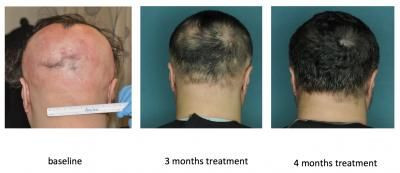Bone Marrow Drug Regrows Hair Completely In Alopecia Sufferers In Five Months

Researchers at Columbia University Medical Center say a drug used to treat bone marrow cancer can restore hair for people suffering from alopecia areata. The researchers found ruxolitinib, which already has been approved by the Food and Drug Administration, produced total hair regrowth within five months and the hair persisted after treatment stopped.
"We've only begun testing the drug in patients, but if the drug continues to be successful and safe, it will have a dramatic positive impact on the lives of people with this disease," Dr. Raphael Clynes, who led the research, along with Angela M. Christiano, a professor in the departments of Dermatology and of Genetics and Development at Columbia, said in a release.
Alopecia areata is an autoimmune disease that attacks hair follicles, causing hair all over the body to fall out. The problem affects men and women equally and occurs when T-cells begin to attack the base of the hair follicle in response to a danger signal.
The research, published online Monday in the journal Nature Medicine, involved testing the drugs ruxolitinib and tofacitinib separately on mice with extensive hair loss. Both drugs were effective.
Ruxolitinib is used to treat myelofibrosis, a condition in which the bone marrow is replaced by scar tissue and causes decreased blood cell production. Tofacitinib is used to treat rheumatoid arthritis.
Dr. Julian Mackay-Wiggan, director of the Clinical Research Unit in Columbia's Department of Dermatology and a practicing dermatologist, helped conduct a study involving patients with more than 30 percent hair loss because of alopecia areata. In three of the trial's early participants, ruxolitinib completely restored hair loss.
"Patients with alopecia areata are suffering profoundly, and these findings mark a significant step forward for them. The team is fully committed to advancing new therapies for patients with a vast unmet need," Christiano said.
© Copyright IBTimes 2025. All rights reserved.






















